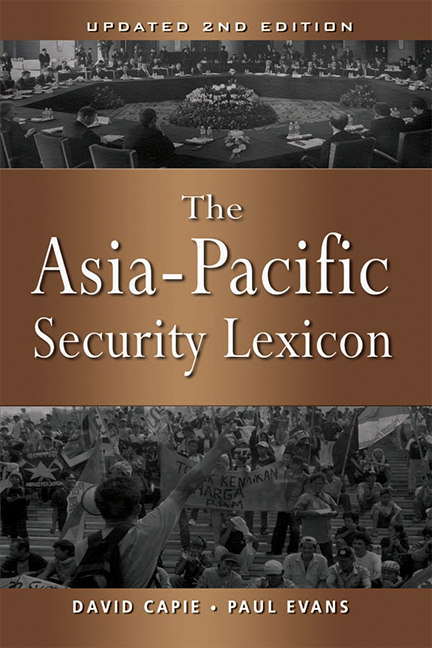Book contents
- Frontmatter
- Contents
- Abbreviations
- Introduction to the Second Edition
- Ad Hoc Multilateralism
- A la Carte Multilateralism
- The “ASEAN Way”
- Balance of Power
- Bilateralism
- Coalition of the Willing
- Coercive Diplomacy
- Collective Defence
- Collective Security
- Common Security
- Comprehensive Security
- Concert of Powers
- Concerted Unilateralism
- Confidence-Building Measures
- Confidence- and Security-Building Measures
- Constructive Intervention
- Cooperative Security
- Engagement
- Flexible Consensus
- Human Security
- Humanitarian Intervention
- Middle Power
- Multilateralism
- Mutual Security
- New Security Approach
- Non-Traditional Security
- Open Regionalism
- Peaceful Rise
- Pre-emption and Preventive War
- Preventive Diplomacy
- Security Community
- Terrorism
- Track One
- Track One-and-a-Half
- Track Two
- Track Three
- Transparency
- Trust-Building Measures
- About the Authors
Mutual Security
Published online by Cambridge University Press: 21 October 2015
- Frontmatter
- Contents
- Abbreviations
- Introduction to the Second Edition
- Ad Hoc Multilateralism
- A la Carte Multilateralism
- The “ASEAN Way”
- Balance of Power
- Bilateralism
- Coalition of the Willing
- Coercive Diplomacy
- Collective Defence
- Collective Security
- Common Security
- Comprehensive Security
- Concert of Powers
- Concerted Unilateralism
- Confidence-Building Measures
- Confidence- and Security-Building Measures
- Constructive Intervention
- Cooperative Security
- Engagement
- Flexible Consensus
- Human Security
- Humanitarian Intervention
- Middle Power
- Multilateralism
- Mutual Security
- New Security Approach
- Non-Traditional Security
- Open Regionalism
- Peaceful Rise
- Pre-emption and Preventive War
- Preventive Diplomacy
- Security Community
- Terrorism
- Track One
- Track One-and-a-Half
- Track Two
- Track Three
- Transparency
- Trust-Building Measures
- About the Authors
Summary
Its origins lie in the Cold War confrontation between the United States and the Soviet Union. In the late 1980s, scholars and officials from both superpowers came together to form several working groups on the topic and in 1990, they published a joint study entitled Mutual Security: A New Approach to Soviet-American Relations.
As its name suggests, mutual security shares much with the concept of common security first set out by the 1982 Palme Commission. According to Richard Smoke, for much of the 1980s the terms mutual security and common security were used synonymously. There is also some similarity to other concepts of security. Smoke and Viktor Kremenyuk add, “the mutual security approach could also be called a ‘cooperative security’ approach.” They contrast it with competitive, unilateral, or zero-sum approaches to security.
According to Smoke and Kremenyuk, mutual security is an approach particularly relevant for parties that are, or might be, in conflict with one another. These groups can be states, or alliances made up of several states, such as the North Atlantic Treaty Organization (NATO) or the Warsaw Pact. Mutual security “calls for each of [the parties] to seek to gain security by seeking more security for both of them”. Mutual security assumes that both sides to a conflict can take actions that make them feel more secure within the same time period. These actions include the use of defence strategies, and trust-building, arms reduction, and verification policies.
Within the broad framework set out above, Smoke discusses three kinds of mutual security. The first is technical mutual security. This minimalist approach to mutual security acknowledges the inter-relationship between the security of one party and that of another. It endorses a moderate range of confidence- and security building measures to try and prevent crises from arising. It focuses its efforts on preventing the danger of “inadvertent escalation” between opponents — the idea that a developing crisis will escalate to levels neither side wants. Specific policies given by Smoke include the use of the “hotline” between Washington and Moscow, and the promotion of security dialogue.
- Type
- Chapter
- Information
- The Asia-Pacific Security Lexicon (Upated 2nd Edition) , pp. 165 - 168Publisher: ISEAS–Yusof Ishak InstitutePrint publication year: 2007

